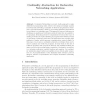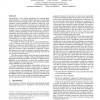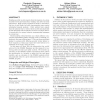293 search results - page 53 / 59 » Reasoning About States of Probabilistic Sequential Programs |
CAV
2009
Springer
14 years 8 months ago
2009
Springer
ity Abstraction for Declarative Networking Applications Juan A. Navarro P?erez, Andrey Rybalchenko, and Atul Singh Max Planck Institute for Software Systems (MPI-SWS) Declarative N...
CACM
2010
13 years 7 months ago
2010
Exploiting the multiprocessors that have recently become ubiquitous requires high-performance and reliable concurrent systems code, for concurrent data structures, operating syste...
PLDI
2012
ACM
11 years 10 months ago
2012
ACM
Linearizability is a key design methodology for reasoning about tations of concurrent abstract data types in both shared memory and message passing systems. It provides the illusi...
SIGSOFT
2007
ACM
14 years 8 months ago
2007
ACM
Automated verification is a technique for establishing if certain properties, usually expressed in temporal logic, hold for a system model. The model can be defined using a high-l...
SIGADA
2004
Springer
14 years 25 days ago
2004
Springer
Existing security models require that information of a given security level be prevented from “leaking” into lower-security information. High-security applications must be dem...



